Rural crime: Farmers 'feel like sitting ducks'
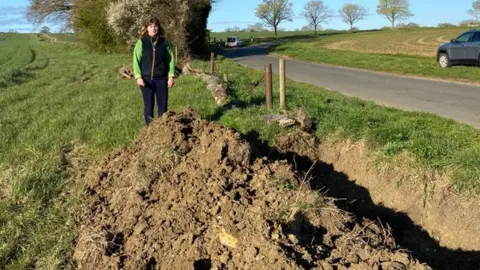 Freya Morgan
Freya MorganA farmer who saw a sharp rise in crime on her land has told how she has blocked 50 gateways, dug ditches around fields and hired a private security firm to protect her business.
Freya Morgan, 57, said the 10 crimes on her north Bedfordshire farm in 2020 included hare coursing and fly-tipping.
The security upgrades have cost her at least £12,000, she estimates.
The National Farmers Union (NFU) has called on police forces to increase resources for tackling rural crime.
It said a survey of its members had revealed that rural crime had cost the average victim £5,100, with one in 10 respondents putting the bill at £10,000 or more.

'No other workplace has that level of damage'
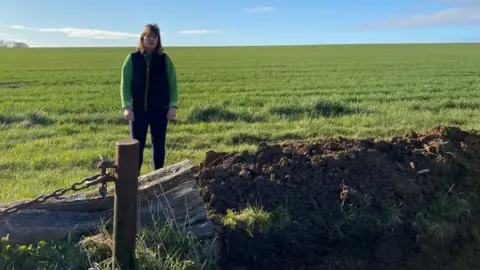 Freya Morgan
Freya MorganMrs Morgan said: "Our main issue is hare coursing - when organised criminals chase hares for large bets of money."
As well as spending about £8,000 putting up about 50 lockable gates to fields and tracks on the farm, she has dug ditches "as a physical barrier" and erected a £4,000 electric entrance gate.
Fly-tipping is another blight, including "the odd caravan dump".
The county's rural policing team is based a 90-minute drive away at Dunstable.
Mrs Morgan said: "We need more rural police officers and we need them distributed about the county better."
Since last year, she has paid £50 a month to a private security firm which conducts night patrols.
"It's a good return, as you go to bed at night knowing that someone is keeping an eye on your property when you cannot do it.
"No other workplace has this level of damage or risk sitting over their business."

'It's a change for us to feel this vulnerable'
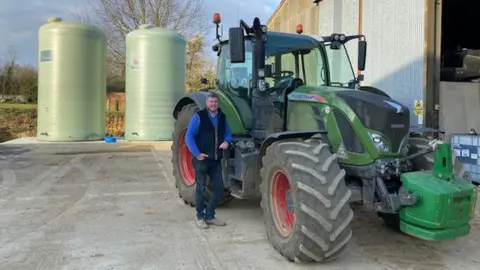 Bill Baker
Bill BakerThieves broke into Bill Baker's mid-Suffolk farm last year, stealing GPS guidance systems worth £50,000 from four tractors and a combine harvester.
"They were a highly organised crime gang and obviously have a market for what they are stealing," he said.
"It was harvest time too, so we just had to stand still for a week waiting for the replacements."
Mr Baker, 57, has since spent more than £30,000 on CCTV cameras, alarm systems, tracking devices and general security.
Hare coursers began to target his farm two years ago, he said, adding that "fly-tipping is a massive, massive curse, which has got worse during lockdown".
"It's a change for us to feel this vulnerable and this targeted and it's frightening to feel like sitting ducks," he said.
"I'd like to see more rural police, more crime solved and more prosecutions."

'No-one would take responsibility'
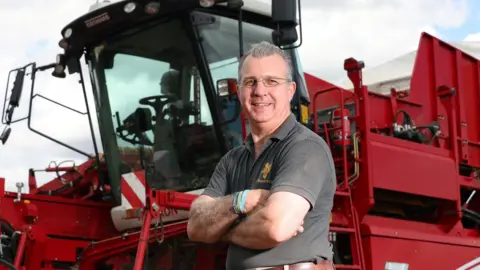 Adam Fradgley
Adam FradgleyTim Papworth's north Norfolk farm business has suffered from fly-tipping, arson and the theft of fuel, GPS and tools since 2019, costing the business about £50,000.
Fly-tipping went up sharply during the pandemic "from DIY at home - big bricks, plasterboard, wallpaper", he said.
But the worst incident was in February 2020 when a man filled an old caravan with unwanted items, towed it on to his land, got it stuck in a farm gate and set it alight, leaving Mr Papworth, 52, to sort out the mess.
He contacted several authorities, including the police, the local council and the Environment Agency, but ended up having to clear the debris himself.
"If I touch it then it becomes my responsibility - if I move it to a roadside then I'm accused of fly-tipping," he said.
"I'm a bit peeved to say the least that no-one would take responsibility."
Eventually he removed the remains at his own expense "costing me several hundreds of pounds".

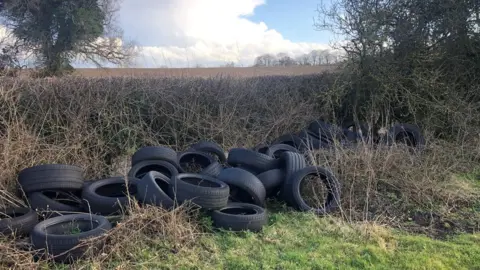 Tim Papworth
Tim PapworthThe National Farming Union (NFU) East Anglia regional director Gary Ford said: "Crimes like hare coursing, fly-tipping, dog attacks on livestock and theft of large and small machinery have left rural residents feeling more vulnerable.
"Rural crime remains a blight on the countryside."
Some 252 members took part in an NFU rural crime survey ahead of the Police and Crime Commissioner elections on 6 May.
They described the crime prevention measures they had introduced on farms over the past five years, from blocking field entrances to introducing CCTV.
Mr Ford said: "Many members appreciate the response they receive from the police on rural crime but feel that rural teams are under-funded and under-resourced."

Find BBC News: East of England on Facebook, Instagram and Twitter. If you have a story suggestion please email [email protected]
